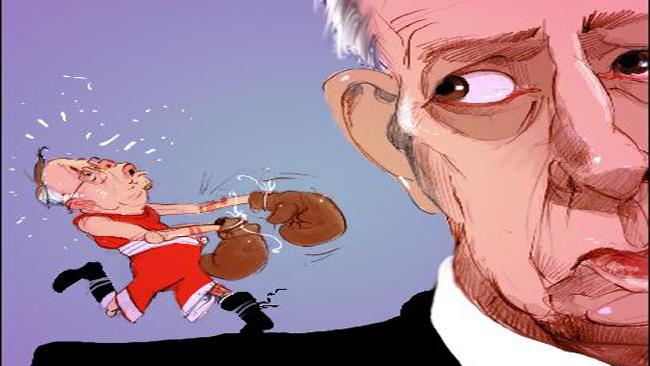
AS Labor reels federally, demonising the Liberal premiers has become Wayne Swan's stock in trade. A man who makes enemies effortlessly, the outcomes of his strategy in Western Australia speak for themselves. But, as a Queenslander, the Treasurer has focused his attacks on Campbell Newman, denouncing his spending reductions as "unnecessary" while claiming they are "in stark contrast to those of the Gillard government".
On that contrast, Swan is entirely correct. For the Gillard government is not tainted with profligacy; it is drenched in it. Little wonder it has failed to deliver on its much touted budget surplus.
But Swan won't admit to any such link. Rather, his latest excuse for the deficit is that real GDP has been increasing more rapidly than nominal GDP, undermining revenue growth. The main virtue of that explanation is that the mug punter can't understand it; but in the great class of sequiturs it falls squarely in the non's.
The reality is that from 2007-08 to 2011-12 nominal GDP rose 2 1/2 times as much as real GDP, which was itself increasing at or above trend; and, even more importantly, soaring terms of trade increased gross national income at more than 1.5 times the rate at which real GDP was rising.
All that created ample room for fiscal consolidation. And under those circumstances Swan's own fiscal rules demanded a rapid return to surplus. But Swan has had better things to do: in particular increasing government spending, which has outpaced GDP, national income and government revenues. Far from reversing the spending growth of Howard's final term, the result is a structural budget deficit which exceeds 2 per cent of GDP and which would more than double were the Gillard government's costly promises implemented.
That is bad enough; but Swan also wants to stop Queensland putting its house in order. Yet Queensland's fiscal position remains perilous; indeed, Queensland's deficit in 2011-12 was nearly twice Victoria's at the height of the crisis that brought Jeff Kennett to office in 1992. Moreover, Queensland's gross debt has grown tenfold in five years and, as a share of gross state product, is double any other state.
Underlying that deterioration is public spending growth, which, under Labor, exceeded all other states. That was largely due to rapidly rising outlays on public servants, with the number of government employees up 40 per cent since 2000, while public service wages increased at 1 1/2 times the national average. With expenditure on employees running ahead of revenues, Queensland has borrowed to pay for an unsustainably large, frequently inefficient, bureaucracy.
To make matters worse, Queensland spent heavily on projects whose costs greatly exceed their benefits. Flawed investments by Labor, including the Western Corridor Recycled Water Project and the Tugun Desalination Plan, are now worth $6 billion less than was borrowed to fund them. Although less visible, that loss almost exactly equals that Victorians incurred from the spectacular failures which preceded Kennett's election, including the collapse of the State Bank of Victoria and its merchant bank, Tricontinental.
But even putting the stranded assets aside, Queensland's public enterprises have had excess costs hoisted on to them by governments playing owner and regulator. Those enterprises therefore earn one third to one half their opportunity cost of capital, with taxpayers' wearing the rest.
Overall, Queensland suffers the double whammy of cost blowouts and revenue deficiencies in recurrent operations and an under-performing asset base. And, with Labor leaving gross debt trending to 30 per cent of GSP within a decade, Queensland's access to borrowing risks deteriorating as capital markets absorb the lessons of the eurozone crisis.
Central among those lessons is that, when hard times come, fiscally reckless governments struggle to eliminate inefficiencies and are forced into fire sales of their assets. Markets therefore value their assets at a steep discount, so that a dollar of assets on the public sector's balance sheet is worth less than that same asset in private ownership. As those assets are written down, credit ratings are lowered, interest rate spreads rise and even the most worthwhile public investments become difficult to finance: a situation economists refer to as "debt overhang".
To avert that risk, Queensland needs a fiscal turnaround of about 10 per cent of GSP, broadly similar to that Kennett effected in Victoria. Newman's first budget moved in that direction, slashing trend spending growth from Labor's 7.6 per cent to 1.5 per cent; but a further substantial effort is required.
Every aspect of that effort will be painful and controversial, with privatisations being especially sensitive. Although debt withdrawal is critical to prevent debt overhang, Newman should ensure privatisations are not merely an exercise in shrinking the government's balance sheet; rather, they must allow assets to be used more efficiently. As well as many successes, Kennett had some failures in that respect, notably in transport, so the Newman government must study that experience carefully.
Most of all, Queenslanders need to understand the extent of their predicament. Full publication of the Costello audit can only enhance that public understanding and is now timely.
In an ideal world, the Newman government's efforts would receive at least quiet encouragement from Canberra, despite the political divide. As Europe's woes show, the nation has much at stake in the fiscal health of its jurisdictions. When Kennett turned Victoria's finances around, he therefore got that quiet encouragement and more from Paul Keating.
Keating, however, had proven his stuff: facing up to fiscal imperatives, he cut government spending by nearly 5 per cent in real terms in two years, and reduced outlays from 27 per cent of GDP when he came to office to 23 per cent by 1989-90.
But Swan is no Keating, no matter how loud he snarls. And, as he runs from excuse to excuse, it is clear that he never will be.



